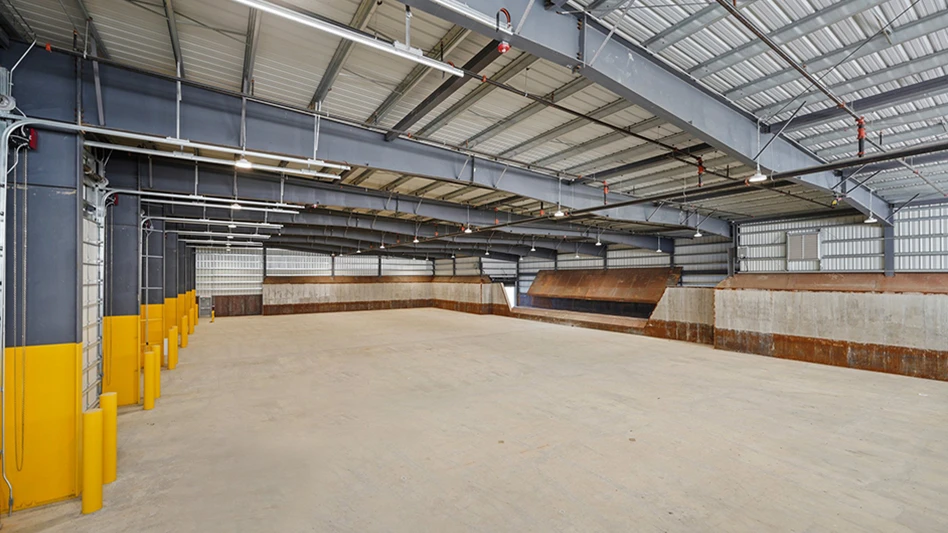
Gaeta Recycling Co. Inc. in Paterson, New Jersey, is a fifth-generation waste and recycling business whose roots date back to 1935. To serve its client base of roughly 30 municipalities and 6,000 commercial customers, the company boasts 180 employees and a fleet of 120 trucks.
The company also operates its own material recovery facility and transfer station for the municipal waste, bulky waste, dry industrial waste, vegetative waste and construction & demolition materials it processes. And while the company is licensed to process 400 tons per day out of its existing transfer station, Gaeta has been routinely handling more than 700 tons per day over the last several months thanks to COVID-related exemptions.
With the high volume of incoming material the company has to contend with, the right equipment is essential for facilitating smooth and seamless operations, which is something Gaeta Recycling President Michael Portannese learned the hard way.

A new solution
Gaeta has long relied on excavators for its material handling operations at its transfer station, but after buying a new unit three years ago only to be let down with nonstop maintenance issues, the company decided to go in another direction.
Mr. Portannese says that a friend at a nearby scrap recycling and auto wrecking company recommended Gaeta give Sennebogen material handlers a try due to their positive experiences operating them at their facility. After testing some of Sennebogen’s competitors’ equipment, Mr. Portannese says the Sennebogen machine stood out right away when they finally got a chance to operate one.
“[The other equipment] couldn’t pick up the loads that we were hoping for, the grapple size was just wrong, it wasn’t working out,” Mr. Portannese says. “I was then introduced to a salesman at Komatsu Northeast who offered to bring the Sennebogen 818 material handler for us to test out, and we loved it.”
Wanting added hydraulic power and weight, Gaeta made the decision to invest in the larger Sennebogen 821 wheeled material handler. The company also decided to upgrade to a longer boom and a three-over-two-grapple attachment as opposed to a rotating clamshell grapple.
After taking possession on Oct. 22, 2019, Mr. Portannese says the company wasted no time in putting the Sennebogen into action, deploying it to the facility’s operating floor the very next day.
New and improved
After dealing with repetitive service issues with the company’s older excavators, often stemming from software diagnostic issues, Mr. Portannese says that the scaled back design of the Sennebogen gives the company all the functionality it needs without the superfluous gadgets and technology it doesn’t.

“What really sold us on the machine is the fact that there’s only one computer that runs the injectors on the engine, besides that, the entire machine is not computerized. Sennebogen has simplified the machine and they’ve made it very, very user friendly,” Mr. Portannese says. “They’ve made it for the basic user. Our model has a Cummins engine, and [when we need to service the software], we can plug our laptop into the computer, which makes it so easy. You don’t have to worry about a tech coming out and having to work on it. We can do it all in house.”
Beyond better uptime, the switch to the wheeled Sennebogen material handler has allowed for safer, more efficient operations thanks to its design and more responsive joystick control that facilitates easier sorting and handling.
“We were used to the tracked excavators and having to drive on the piles of waste to move our incoming volumes. Now with the wheeled Sennebogen, we can simply work next to the piles because that material handler has a longer reach and it also makes it easier to pick up a bigger scoop, a heavier payload, which in return, allows us to load a trailer that much faster, a lot safer and we don’t have to get on top of a pile,” Mr. Portannese says.
Mr. Portannese also says that since the material handler isn’t built for digging like excavators are, operators don’t have to worry about trying to manage the downward force of the boom. This allows operators to quickly collect material and load it into the on-site trailers. The Sennebogen 821 also has an elevated driver’s cab, which makes it easier for drivers to see what they’re doing and cut down on the possibility of accidents. Plus, Sennebogen upfitted the unit with a reversing fan, allowing the radiator to be cleaned periodically and the machine to stay cool.
Looking to grow
Mr. Portannese says that since taking possession, his Sennebogen 821 has been in operation from 6 a.m. to 10 p.m. six days a week with little exception outside of routine maintenance to keep up with demand.
Despite this workload, Gaeta Recycling is currently looking to expand and renovate its transfer station to allow the company to process even more material. According to Mr. Portannese, the company is awaiting approval to take in an additional 500 tons per day.
With the potential for greater volumes in the near future, Mr. Portannese says that should the company need help in ramping up its material handling capacity, it knows where to turn.
“Upon our expansion, if we need another material handler, it’ll definitely be a Sennebogen,” he says.
Get curated news on YOUR industry.
Enter your email to receive our newsletters.
Explore the September 2020 Issue
Check out more from this issue and find your next story to read.
Latest from Waste Today
- ReMA board to consider changes to residential dual-, single-stream MRF specifications
- Miller Environmental Group Inc. appoints CEO
- DPI acquires Concept Plastics Co.
- Laurel Mountain Capital announces investment in 5280 Waste Solutions
- Cielo investor requests annual meeting
- WIH Resource Group celebrates 20th anniversary
- NWRA: NIOSH cuts a step in the wrong direction
- Valicor Environmental services acquires Affordable Waste Management





